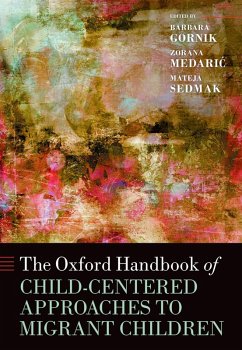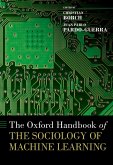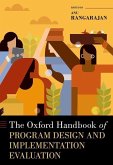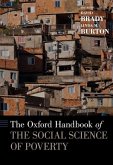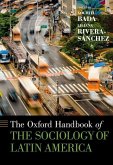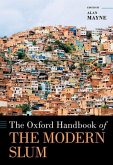Zorana Medaric, Mateja Sedmak
The Oxford Handbook of Child-Centered Approaches to Migrant Children
Herausgeber: Gornik, Barbara
Zorana Medaric, Mateja Sedmak
The Oxford Handbook of Child-Centered Approaches to Migrant Children
Herausgeber: Gornik, Barbara
- Gebundenes Buch
- Merkliste
- Auf die Merkliste
- Bewerten Bewerten
- Teilen
- Produkt teilen
- Produkterinnerung
- Produkterinnerung
The Oxford Handbook of Child-Centered Approaches to Migrant Children provides a comprehensive overview of the key issues and debates shaping the child-centred approach to migrant children. It presents key concepts, approaches and methods as well as case studies, legal and policy issues. In this way, the Handbook provides foundational knowledge that can be utilised in further research and practice with migrant children in different contexts.
Andere Kunden interessierten sich auch für
![The Oxford Handbook of the Sociology of Machine Learning The Oxford Handbook of the Sociology of Machine Learning]() Juan Pablo Pardo-GuerraThe Oxford Handbook of the Sociology of Machine Learning221,99 €
Juan Pablo Pardo-GuerraThe Oxford Handbook of the Sociology of Machine Learning221,99 €![The Oxford Handbook of Program Design and Implementation Evaluation The Oxford Handbook of Program Design and Implementation Evaluation]() Anu RangarajanThe Oxford Handbook of Program Design and Implementation Evaluation166,99 €
Anu RangarajanThe Oxford Handbook of Program Design and Implementation Evaluation166,99 €![Oxford Handbook of the Social Science of Poverty Oxford Handbook of the Social Science of Poverty]() Oxford Handbook of the Social Science of Poverty225,99 €
Oxford Handbook of the Social Science of Poverty225,99 €![The Oxford Handbook of the Sociology of Latin America The Oxford Handbook of the Sociology of Latin America]() The Oxford Handbook of the Sociology of Latin America225,99 €
The Oxford Handbook of the Sociology of Latin America225,99 €![The Oxford Handbook of Intergenerational Connections The Oxford Handbook of Intergenerational Connections]() The Oxford Handbook of Intergenerational Connections192,99 €
The Oxford Handbook of Intergenerational Connections192,99 €![The Oxford Handbook of W. E. B. Du Bois The Oxford Handbook of W. E. B. Du Bois]() The Oxford Handbook of W. E. B. Du Bois201,99 €
The Oxford Handbook of W. E. B. Du Bois201,99 €![The Oxford Handbook of the Modern Slum The Oxford Handbook of the Modern Slum]() The Oxford Handbook of the Modern Slum171,99 €
The Oxford Handbook of the Modern Slum171,99 €-
-
-
The Oxford Handbook of Child-Centered Approaches to Migrant Children provides a comprehensive overview of the key issues and debates shaping the child-centred approach to migrant children. It presents key concepts, approaches and methods as well as case studies, legal and policy issues. In this way, the Handbook provides foundational knowledge that can be utilised in further research and practice with migrant children in different contexts.
Produktdetails
- Produktdetails
- Verlag: Oxford University Press
- Seitenzahl: 690
- Erscheinungstermin: 24. Juni 2025
- Englisch
- Abmessung: 241mm x 168mm x 48mm
- Gewicht: 1293g
- ISBN-13: 9780197654750
- ISBN-10: 0197654754
- Artikelnr.: 73666162
- Herstellerkennzeichnung
- Libri GmbH
- Europaallee 1
- 36244 Bad Hersfeld
- gpsr@libri.de
- Verlag: Oxford University Press
- Seitenzahl: 690
- Erscheinungstermin: 24. Juni 2025
- Englisch
- Abmessung: 241mm x 168mm x 48mm
- Gewicht: 1293g
- ISBN-13: 9780197654750
- ISBN-10: 0197654754
- Artikelnr.: 73666162
- Herstellerkennzeichnung
- Libri GmbH
- Europaallee 1
- 36244 Bad Hersfeld
- gpsr@libri.de
Barbara Gornik is a Senior Research Associate at the Science and Research Centre Koper, Slovenia. Her main research interests are anthropology, human and children's rights, nationalism, and child migration. Until June 2022 she worked as Academic Co-coordinator of the Horizon 2020 Research and Innovation Action "Migrant Children and Communities in a Transforming Europe" (MiCREATE). In 2021, she became a member of the Scientific Research Council for Humanities, a permanent expert body of the Slovenian Research Agency. She is a member of the editorial board of Studies in Ethnicity and Nationalism published by Wiley-Blackwell on behalf of the LSE's Association for the Study of Ethnicity and Nationalism. Zorana Medaric is a sociologist and a research associate at the Science and Research Centre Koper, Slovenia. Her research interests include migration, childhood studies, qualitative research and child-centred approaches, with a particular focus on the experiences of children in migration contexts. From 2009 to 2021 she was a researcher and lecturer at the Faculty of Tourism Studies at the University of Primorska. As a researcher, she has been involved in various national and international projects, including Growing Up in Digital Europe (GUIDE), Europe's first longitudinal comparative birth cohort study of children's and young people's wellbeing. Mateja Sedmak is Principal Research Associate and the Head of the Institute for Social Sciences at the Science and Research Centre Koper, Slovenia. Her research interests include ethnic and intercultural studies, migration and integration, sociology of everyday life and sociology of family. She is Vice President of the Slovenian Sociological Association and the head of the Section for Intercultural Studies. She has led many international projects, including the "Migrant Children and Communities in a Transforming Europe" (MiCREATE) RIA Horizon 2020 project. She is also National Coordinator of "Growing Up in Digital Europe" (GUIDE) research infrastructure, Europe's first longitudinal cross-national birth cohort study.
* Acknowledgments
* About the Editors
* Contributors
* Preface
* 1. Introduction: The Child-Centered Approaches to Migrant Children
* Barbara Gornik, Zorana Medaric, and Mateja Sedmak
* Part I: Concepts and Models
* 2. Characteristics and Challenges of Child-Centered Approach with
Migrant Children
* Zorana Medaric
* 3. The Social Conditions of (Migrant) Children's Agency in Global
Society
* Claudio Baraldi
* 4. The Five-Dimensions Model of Migrant Children's Subjective
Well-Being
* Sabine Andresen and Barbara Gornik
* 5. Migrant Children as Agents in the Adult-Centered Political Space
* Barbara Gornik
* 6. Against Adultism in Research with and about Migrant Children:
Outlines of a Child-Centered Approach
* Urszula Markowska-Manista and Manfred Liebel
* 7. Transforming Participation of Children of Migrant Origin in
Research Projects
* Shoba Arun and Jesicca Ozan
* 8. Fostering Child Centered Educational Settings for Students of
Immigrant Origin
* Carola Suarez-Orozco
* 9. An Intergenerational Justice Approach to the Sustainable Support
of Migrant Children
* Judi Mesman
* Part II: Methods and Approaches
* 10. Ethical Challenges in Researching Migrant Children
* Zorana Medaric
* 11. Migrant Children as Co-Constructors and Advisors in Research
* Deirdre Horgan, Shirley Martin, Jacqui O'Riordan, Reana Maier, and
the IMMERSE Children and Young People's Advisory Group
* 12. Positional Multi-Method Approach to Elicit Migrant Children's
Subjectivities
* Chiara Massaroni
* 13. Participatory Visual Methods in Child-Centered Migration Research
* Søren Sindberg Jensen and Gro Hellesdatter Jacobsen
* 14. Migrant Children's Photography as Transformative Practice in
Early Childhood Education
* Annika Åkerblom
* 15. Storyboard Peers: A Child-Centered, Peer-Mediated, Visual and
Narrative Approach to Research and Practice with Forced Migrant Youth
* Jessica Ball
* 16. Philosophy with Children (PwC) as a Pedagogical Approach and
Research Method
* Søren Sindberg Jensen
* 17. Autobiographical Life Stories of Migrant Children through a
Child-Centered Lens
* Mateja Sedmak
* 18. Child-Centered Approaches in Digital Research with Migrant
Children
* Koen Leurs
* 19. A Child-Centered Approach to Longitudinal Data Collection
* Haridhan Goswami and Gary Pollack
* Part III: Voices and Perspectives
* 20. Migrant Children's Experiences and the State-Centered Regimes in
Colombia
* Nohora Constanza Niño Vega
* 21. Legal Consciousness and Agency of Unaccompanied Migrant Children
on the Move
* Bastien Roland and Annalisa Lendaro
* 22. Child Guides and Migration in the U.S.-Mexico Border Region
* Kate Swanson, Rebecca Maria Torres, and Sarah Blue
* 23. Young Children's Learning Environments in East African Refugee
Camps
* Nerea Amorós Elorduy
* 24. Ghanaian Transnational Households and the Children "Left Behind"
* Michael Boampong and Jahan Foster Zabit
* 25. Girls' Irregular Migration, Return and Reintegration in
Somaliland
* Fathima Azmiya Badurdeen
* 26. Intersectional Perspective on Migrant Children's Integration in
Austrian Schools
* Stella Louise Wolter, Rosa Tatzber, and Birgit Sauer
* 27. A Case Study Exploring the Integration Experiences of Child
Migrants in Malaysia
* Thavamalar Thuraisingam, Jason James Turner, and Kelly Tee Pei Leng
* 28. Romani Refugee Youth Perspectives on School and Work in Canada
* Sara Swerdlyik
* Part IV: Policy and Legal Issues
* 29. Migrant Children's Participation in Political and Democratic Life
* Barbara Janta and Michaela Bruckmayer
* 30. A Child-Centered Approach to Representing Children in Immigration
Legal Systems
* Laila L. Hlass and Lindsay M. Harris
* 31. A Child-Centered Approach to Asylum Policy and Practice
* Nancy Kelly and John Willshire Carrera
* 32. Benefit of the Doubt and Presumption of Minority in Age
Assessment
* John Dorber and Mark Klaassen
* 33. A Child-Centered Perspective and EU Integration Policies
* Veronika Bajt and Vlasta Jalusic
* 34. Promoting Migrant Children's Rights by Developing Child-Centered
Information
* Helen Stalford and Tilly Clough
* About the Editors
* Contributors
* Preface
* 1. Introduction: The Child-Centered Approaches to Migrant Children
* Barbara Gornik, Zorana Medaric, and Mateja Sedmak
* Part I: Concepts and Models
* 2. Characteristics and Challenges of Child-Centered Approach with
Migrant Children
* Zorana Medaric
* 3. The Social Conditions of (Migrant) Children's Agency in Global
Society
* Claudio Baraldi
* 4. The Five-Dimensions Model of Migrant Children's Subjective
Well-Being
* Sabine Andresen and Barbara Gornik
* 5. Migrant Children as Agents in the Adult-Centered Political Space
* Barbara Gornik
* 6. Against Adultism in Research with and about Migrant Children:
Outlines of a Child-Centered Approach
* Urszula Markowska-Manista and Manfred Liebel
* 7. Transforming Participation of Children of Migrant Origin in
Research Projects
* Shoba Arun and Jesicca Ozan
* 8. Fostering Child Centered Educational Settings for Students of
Immigrant Origin
* Carola Suarez-Orozco
* 9. An Intergenerational Justice Approach to the Sustainable Support
of Migrant Children
* Judi Mesman
* Part II: Methods and Approaches
* 10. Ethical Challenges in Researching Migrant Children
* Zorana Medaric
* 11. Migrant Children as Co-Constructors and Advisors in Research
* Deirdre Horgan, Shirley Martin, Jacqui O'Riordan, Reana Maier, and
the IMMERSE Children and Young People's Advisory Group
* 12. Positional Multi-Method Approach to Elicit Migrant Children's
Subjectivities
* Chiara Massaroni
* 13. Participatory Visual Methods in Child-Centered Migration Research
* Søren Sindberg Jensen and Gro Hellesdatter Jacobsen
* 14. Migrant Children's Photography as Transformative Practice in
Early Childhood Education
* Annika Åkerblom
* 15. Storyboard Peers: A Child-Centered, Peer-Mediated, Visual and
Narrative Approach to Research and Practice with Forced Migrant Youth
* Jessica Ball
* 16. Philosophy with Children (PwC) as a Pedagogical Approach and
Research Method
* Søren Sindberg Jensen
* 17. Autobiographical Life Stories of Migrant Children through a
Child-Centered Lens
* Mateja Sedmak
* 18. Child-Centered Approaches in Digital Research with Migrant
Children
* Koen Leurs
* 19. A Child-Centered Approach to Longitudinal Data Collection
* Haridhan Goswami and Gary Pollack
* Part III: Voices and Perspectives
* 20. Migrant Children's Experiences and the State-Centered Regimes in
Colombia
* Nohora Constanza Niño Vega
* 21. Legal Consciousness and Agency of Unaccompanied Migrant Children
on the Move
* Bastien Roland and Annalisa Lendaro
* 22. Child Guides and Migration in the U.S.-Mexico Border Region
* Kate Swanson, Rebecca Maria Torres, and Sarah Blue
* 23. Young Children's Learning Environments in East African Refugee
Camps
* Nerea Amorós Elorduy
* 24. Ghanaian Transnational Households and the Children "Left Behind"
* Michael Boampong and Jahan Foster Zabit
* 25. Girls' Irregular Migration, Return and Reintegration in
Somaliland
* Fathima Azmiya Badurdeen
* 26. Intersectional Perspective on Migrant Children's Integration in
Austrian Schools
* Stella Louise Wolter, Rosa Tatzber, and Birgit Sauer
* 27. A Case Study Exploring the Integration Experiences of Child
Migrants in Malaysia
* Thavamalar Thuraisingam, Jason James Turner, and Kelly Tee Pei Leng
* 28. Romani Refugee Youth Perspectives on School and Work in Canada
* Sara Swerdlyik
* Part IV: Policy and Legal Issues
* 29. Migrant Children's Participation in Political and Democratic Life
* Barbara Janta and Michaela Bruckmayer
* 30. A Child-Centered Approach to Representing Children in Immigration
Legal Systems
* Laila L. Hlass and Lindsay M. Harris
* 31. A Child-Centered Approach to Asylum Policy and Practice
* Nancy Kelly and John Willshire Carrera
* 32. Benefit of the Doubt and Presumption of Minority in Age
Assessment
* John Dorber and Mark Klaassen
* 33. A Child-Centered Perspective and EU Integration Policies
* Veronika Bajt and Vlasta Jalusic
* 34. Promoting Migrant Children's Rights by Developing Child-Centered
Information
* Helen Stalford and Tilly Clough
* Acknowledgments
* About the Editors
* Contributors
* Preface
* 1. Introduction: The Child-Centered Approaches to Migrant Children
* Barbara Gornik, Zorana Medaric, and Mateja Sedmak
* Part I: Concepts and Models
* 2. Characteristics and Challenges of Child-Centered Approach with
Migrant Children
* Zorana Medaric
* 3. The Social Conditions of (Migrant) Children's Agency in Global
Society
* Claudio Baraldi
* 4. The Five-Dimensions Model of Migrant Children's Subjective
Well-Being
* Sabine Andresen and Barbara Gornik
* 5. Migrant Children as Agents in the Adult-Centered Political Space
* Barbara Gornik
* 6. Against Adultism in Research with and about Migrant Children:
Outlines of a Child-Centered Approach
* Urszula Markowska-Manista and Manfred Liebel
* 7. Transforming Participation of Children of Migrant Origin in
Research Projects
* Shoba Arun and Jesicca Ozan
* 8. Fostering Child Centered Educational Settings for Students of
Immigrant Origin
* Carola Suarez-Orozco
* 9. An Intergenerational Justice Approach to the Sustainable Support
of Migrant Children
* Judi Mesman
* Part II: Methods and Approaches
* 10. Ethical Challenges in Researching Migrant Children
* Zorana Medaric
* 11. Migrant Children as Co-Constructors and Advisors in Research
* Deirdre Horgan, Shirley Martin, Jacqui O'Riordan, Reana Maier, and
the IMMERSE Children and Young People's Advisory Group
* 12. Positional Multi-Method Approach to Elicit Migrant Children's
Subjectivities
* Chiara Massaroni
* 13. Participatory Visual Methods in Child-Centered Migration Research
* Søren Sindberg Jensen and Gro Hellesdatter Jacobsen
* 14. Migrant Children's Photography as Transformative Practice in
Early Childhood Education
* Annika Åkerblom
* 15. Storyboard Peers: A Child-Centered, Peer-Mediated, Visual and
Narrative Approach to Research and Practice with Forced Migrant Youth
* Jessica Ball
* 16. Philosophy with Children (PwC) as a Pedagogical Approach and
Research Method
* Søren Sindberg Jensen
* 17. Autobiographical Life Stories of Migrant Children through a
Child-Centered Lens
* Mateja Sedmak
* 18. Child-Centered Approaches in Digital Research with Migrant
Children
* Koen Leurs
* 19. A Child-Centered Approach to Longitudinal Data Collection
* Haridhan Goswami and Gary Pollack
* Part III: Voices and Perspectives
* 20. Migrant Children's Experiences and the State-Centered Regimes in
Colombia
* Nohora Constanza Niño Vega
* 21. Legal Consciousness and Agency of Unaccompanied Migrant Children
on the Move
* Bastien Roland and Annalisa Lendaro
* 22. Child Guides and Migration in the U.S.-Mexico Border Region
* Kate Swanson, Rebecca Maria Torres, and Sarah Blue
* 23. Young Children's Learning Environments in East African Refugee
Camps
* Nerea Amorós Elorduy
* 24. Ghanaian Transnational Households and the Children "Left Behind"
* Michael Boampong and Jahan Foster Zabit
* 25. Girls' Irregular Migration, Return and Reintegration in
Somaliland
* Fathima Azmiya Badurdeen
* 26. Intersectional Perspective on Migrant Children's Integration in
Austrian Schools
* Stella Louise Wolter, Rosa Tatzber, and Birgit Sauer
* 27. A Case Study Exploring the Integration Experiences of Child
Migrants in Malaysia
* Thavamalar Thuraisingam, Jason James Turner, and Kelly Tee Pei Leng
* 28. Romani Refugee Youth Perspectives on School and Work in Canada
* Sara Swerdlyik
* Part IV: Policy and Legal Issues
* 29. Migrant Children's Participation in Political and Democratic Life
* Barbara Janta and Michaela Bruckmayer
* 30. A Child-Centered Approach to Representing Children in Immigration
Legal Systems
* Laila L. Hlass and Lindsay M. Harris
* 31. A Child-Centered Approach to Asylum Policy and Practice
* Nancy Kelly and John Willshire Carrera
* 32. Benefit of the Doubt and Presumption of Minority in Age
Assessment
* John Dorber and Mark Klaassen
* 33. A Child-Centered Perspective and EU Integration Policies
* Veronika Bajt and Vlasta Jalusic
* 34. Promoting Migrant Children's Rights by Developing Child-Centered
Information
* Helen Stalford and Tilly Clough
* About the Editors
* Contributors
* Preface
* 1. Introduction: The Child-Centered Approaches to Migrant Children
* Barbara Gornik, Zorana Medaric, and Mateja Sedmak
* Part I: Concepts and Models
* 2. Characteristics and Challenges of Child-Centered Approach with
Migrant Children
* Zorana Medaric
* 3. The Social Conditions of (Migrant) Children's Agency in Global
Society
* Claudio Baraldi
* 4. The Five-Dimensions Model of Migrant Children's Subjective
Well-Being
* Sabine Andresen and Barbara Gornik
* 5. Migrant Children as Agents in the Adult-Centered Political Space
* Barbara Gornik
* 6. Against Adultism in Research with and about Migrant Children:
Outlines of a Child-Centered Approach
* Urszula Markowska-Manista and Manfred Liebel
* 7. Transforming Participation of Children of Migrant Origin in
Research Projects
* Shoba Arun and Jesicca Ozan
* 8. Fostering Child Centered Educational Settings for Students of
Immigrant Origin
* Carola Suarez-Orozco
* 9. An Intergenerational Justice Approach to the Sustainable Support
of Migrant Children
* Judi Mesman
* Part II: Methods and Approaches
* 10. Ethical Challenges in Researching Migrant Children
* Zorana Medaric
* 11. Migrant Children as Co-Constructors and Advisors in Research
* Deirdre Horgan, Shirley Martin, Jacqui O'Riordan, Reana Maier, and
the IMMERSE Children and Young People's Advisory Group
* 12. Positional Multi-Method Approach to Elicit Migrant Children's
Subjectivities
* Chiara Massaroni
* 13. Participatory Visual Methods in Child-Centered Migration Research
* Søren Sindberg Jensen and Gro Hellesdatter Jacobsen
* 14. Migrant Children's Photography as Transformative Practice in
Early Childhood Education
* Annika Åkerblom
* 15. Storyboard Peers: A Child-Centered, Peer-Mediated, Visual and
Narrative Approach to Research and Practice with Forced Migrant Youth
* Jessica Ball
* 16. Philosophy with Children (PwC) as a Pedagogical Approach and
Research Method
* Søren Sindberg Jensen
* 17. Autobiographical Life Stories of Migrant Children through a
Child-Centered Lens
* Mateja Sedmak
* 18. Child-Centered Approaches in Digital Research with Migrant
Children
* Koen Leurs
* 19. A Child-Centered Approach to Longitudinal Data Collection
* Haridhan Goswami and Gary Pollack
* Part III: Voices and Perspectives
* 20. Migrant Children's Experiences and the State-Centered Regimes in
Colombia
* Nohora Constanza Niño Vega
* 21. Legal Consciousness and Agency of Unaccompanied Migrant Children
on the Move
* Bastien Roland and Annalisa Lendaro
* 22. Child Guides and Migration in the U.S.-Mexico Border Region
* Kate Swanson, Rebecca Maria Torres, and Sarah Blue
* 23. Young Children's Learning Environments in East African Refugee
Camps
* Nerea Amorós Elorduy
* 24. Ghanaian Transnational Households and the Children "Left Behind"
* Michael Boampong and Jahan Foster Zabit
* 25. Girls' Irregular Migration, Return and Reintegration in
Somaliland
* Fathima Azmiya Badurdeen
* 26. Intersectional Perspective on Migrant Children's Integration in
Austrian Schools
* Stella Louise Wolter, Rosa Tatzber, and Birgit Sauer
* 27. A Case Study Exploring the Integration Experiences of Child
Migrants in Malaysia
* Thavamalar Thuraisingam, Jason James Turner, and Kelly Tee Pei Leng
* 28. Romani Refugee Youth Perspectives on School and Work in Canada
* Sara Swerdlyik
* Part IV: Policy and Legal Issues
* 29. Migrant Children's Participation in Political and Democratic Life
* Barbara Janta and Michaela Bruckmayer
* 30. A Child-Centered Approach to Representing Children in Immigration
Legal Systems
* Laila L. Hlass and Lindsay M. Harris
* 31. A Child-Centered Approach to Asylum Policy and Practice
* Nancy Kelly and John Willshire Carrera
* 32. Benefit of the Doubt and Presumption of Minority in Age
Assessment
* John Dorber and Mark Klaassen
* 33. A Child-Centered Perspective and EU Integration Policies
* Veronika Bajt and Vlasta Jalusic
* 34. Promoting Migrant Children's Rights by Developing Child-Centered
Information
* Helen Stalford and Tilly Clough

